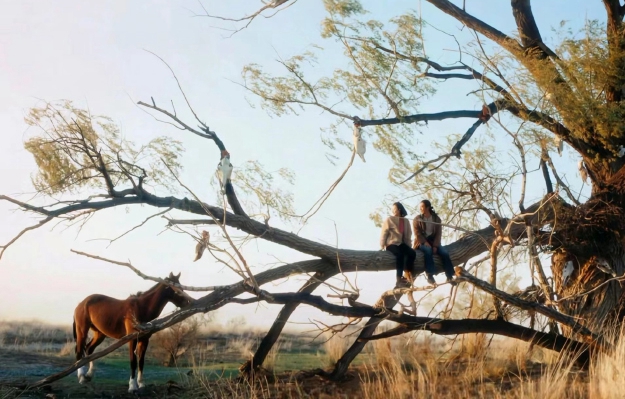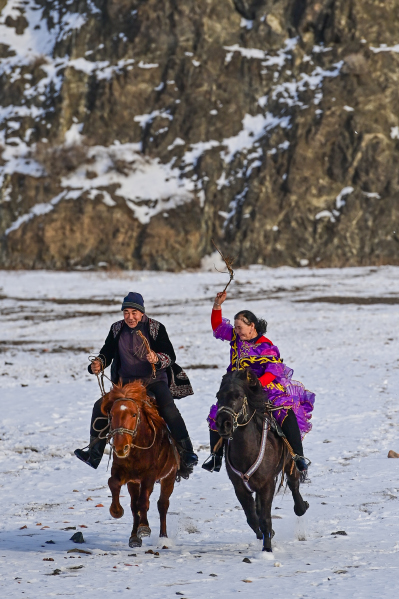
'In the culture of the Kazak ethnic group, people only develop intimacy—either friendship or love—after they truly see and understand one another clearly. For this reason, in their language, the phrase 'I like you' also means 'I truly see you and understand you clearly'." This popular line is from hit TV series To the Wonder. Featuring the distinct nomadic life of the Kazaks in Altay Prefecture, Xinjiang Uygur Autonomous Region, the eight-episode drama has sparked waves of excited discussion about the scenery, people and lifestyle of the area.
Adapted from the prose collection My Altay, a recollection of Xinjiang-born writer Li Juan's own experiences in the spectacular land some 25 years ago, the drama tells how the protagonist, Li Wenxiu, a woman of the Han ethnic group in her early 20s, integrates with the local people. The Han people make up more than 91 percent of the Chinese mainland's population, according to the 2020 national census.
Li Wenxiu's mother, who is from Jiangsu Province in east China, runs a grocery store in a remote Kazak village in Altay. After having suffered setbacks in the city, the protagonist returns to the village to live with her mother and continues to pursue her dream of becoming a freelance writer. One of the most hotly debated topics on social media platforms is how Li Wenxiu gradually understands, admires and fits into the local culture as an outsider. She initially ruffled some feathers by mixing up Kazak names and disregarding cultural norms, but, in the end, she made many Kazak friends and chose to stay there for her career—and love.
"My favorite line is from Li Wenxiu's mother, when she told Li that 'They (the Kazak people) have their own ways of living and their own concepts about how things work. It is your right not to agree with them, but you should not try to change them in a condescending manner. You need to stop feeling smarter because you are from a big city'," Hu Huhu, a photojournalist based in Xinjiang, told Beijing Review.
"Faced with people that we have little knowledge about, we should always uphold the spirit of mutual understanding and respect," he added.
Being seen
Audiences were unreserved in their praise of the drama. On May 9, the third day of its broadcast on state broadcaster China Central Television, To the Wonder was the most watched program in its time slot. As of May 10, the fourth day of its release, it had achieved a cumulative 38.302 million streams on iQiyi, a popular streaming platform in China.
To the Wonder received a rating of 8.8 out of 10 on Douban, a popular Chinese review app, becoming the highest rated domestic TV series so far this year.
As part of the Official Selection for Long Form Competition of the Cannes International Series Festival in April, it is also the first Chinese language series to be selected for inclusion in this competition since its launch in 2018.
In the online fan group of the drama, comments attracting the most likes include "The Altay scenery is like a picture! I've never seen such a wonderland," "I love how the people there lead a simple but vibrant life. I don't have half the vitality they have now" and "It is the first time I have learned about the nomadic life, and seeing how people are trying hard to adapt to modernization while passing down their traditions touched me deeply."
Altay consists of a county-level city and six counties, bordering Mongolia in the northeast, Russia in the north and Kazakhstan in the northwest. Kazaks account for about half of the local population, making the prefecture rich in Kazak nomadic culture.
The TV series brought this area into the national spotlight and tourism in Altay, which usually peaks from June to October, has begun to peak much earlier this year.
According to data from the Altay Culture and Tourism Bureau, from May 13 to 19, Altay had received more than 1 million tourists, a year-on-year increase of 70.07 percent. Tourism revenue during the period was 813 million yuan ($112 million), up 130.97 percent on an annual basis.
"I attended the Xinjiang Tourism Development Conference and the topics related to Altay and To the Wonder were among the hottest ones there," Abduweli Abdurixit, executive producer of the I Am From Xinjiang documentary trilogy, told Beijing Review. The documentaries aim to present the real Xinjiang to the outside world.
At the conference in Turpan, a city in Xinjiang, on May 27 and 28, representatives from different places in the region promoted their tourism products. Among all, the tour routes respectively to the two grasslands in Altay where To the Wonder was shot and Li Juan's hometown in Fuyun County, as well as an immersive program that showcases Altay's rich Kazak culture, received much attention.
"When I was a little boy, the urban area of Altay was so small that it could be covered by two bus routes," Abduweli said. "Now, it has developed a flourishing skiing industry, with tourists bustling around in winter. Facilities that serve these visitors are growing at an unexpected speed.
In recent years, the Altay government has supported the construction of more than 10 ski resorts, with 232 ski trails spanning 248 km.
"I hope the people who are interested in Altay can become more than visitors, pursue a different life and career and achieve their dreams here," Abduweli added.

In the Kazak DNA
The Kazak ethnic group has been leading a nomadic life for thousands of years. To the Wonder reflects the Kazak people's love for their livestock, their efforts to protect the environment, and their respect for and adaptation to the course of nature. The series also shows how their lifestyle has deeply influenced their personalities and customs.
"Many of my colleagues in Beijing have asked me whether the characters in To the Wonder are representative of the Kazak people in real life. I told them that we Kazaks are just as courageous, vibrant, warm-hearted, free and unafraid of the challenges and obstacles that life throws our way as is shown in the series," Sayra Dulat, a member of the Kazak ethnic group who works in Beijing, told Beijing Review.
The series also introduces challenges the Kazak people face in the process of economic and societal modernization and urbanization, including the changing lifestyles, the clash of new and old ideas, and people's attitudes toward them. For example, Batay, the leading male character and also Li Wenxiu's Kazak lover, wants to leave his hometown and abandon the life as a herdsman, leading to the conflict between him and his father, who insists following the traditional nomadic way of living. In the end, the father gives in and respects his son's decision, and the son, after three years of pursuing his dreams, comes back to adopt his father's lifestyle.
"Great changes have taken place in Altay in recent years," Hu said. "For example, many state-of-the-art machines have been introduced for livestock management and the production of dairy products, and hundreds of post stations offering shelter, food and medicines have been built along the Kazak herders' grazing routes. The local government also offers weather forecast services and assistance in emergency situations."
Hu said he believes that either choosing to retain the old lifestyle or starting a new life is a matter of personal choice. "I've known those who stayed in their hometown and lived like their fathers, and also those who left to study and work in other cities," he added.
Bayan Tashen, a young writer who returned to Altay after completing his higher education in Guangzhou, Guangdong Province in south China, is a case in point. He is working on programs to promote his hometown to the outside world.
"The scene in which the leading male character decides to come back to Altay touched me," Bayan told Beijing Review. "I made the same decision after graduating from college. I wanted to witness the changes in my hometown and practice the Kazak language, which I hadn't spoken in for a long time. I think that the end of the series suggests that the Kazak people have a deep-rooted affection and nostalgia for their land, despite its inexorable change and modernization."
(Li Fangfang and Peng Jiawei also contributed to the story)
Copyedited by G.P. Wilson
Comments to zhangyage@cicgamericas.com